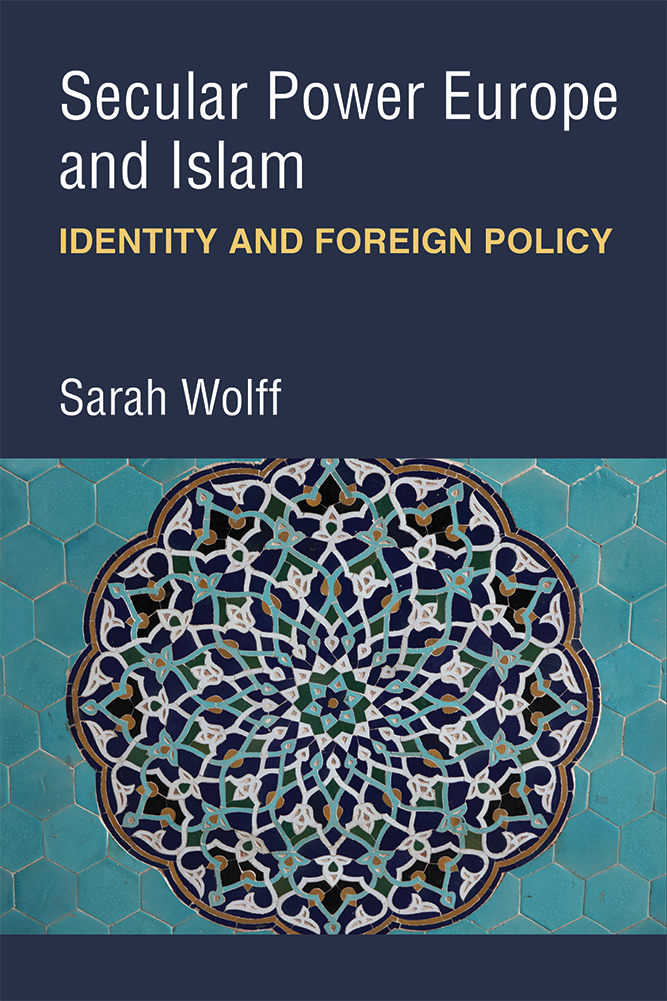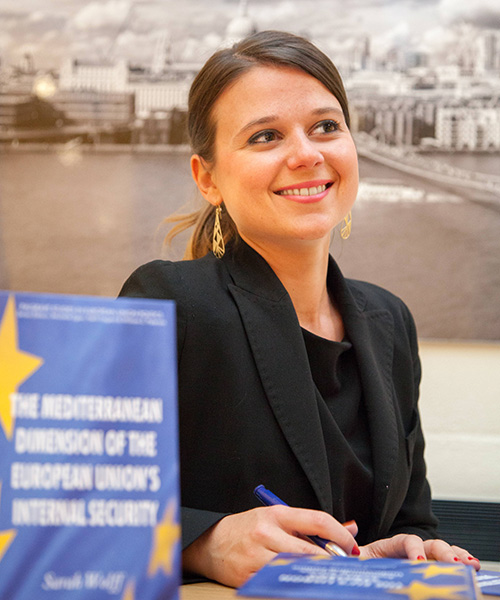In her new book, Secular Power Europe and Islam: Identity and Foreign Policy, Sarah Wolff argues that Europe can be thought of as a secular power, actively promoting norms related to religion and secularism around the world. And because of Europe’s secular identity, Islam confronts the European Union’s existential anxieties about its security and its self-biography.
In this interview with Religion & Diplomacy editor Judd Birdsall, the author shares a number of insights and implications from her research. Sarah Wolff is a Reader in European Politics and International Relations at Queen Mary University in London where she is also Director of the Centre for European Research. Before joining academia, Dr. Wolff worked at the European Commission and the European Parliament.
Judd Birdsall: To begin, let me ask you about the title of the book: Secular Power Europe and Islam. There’s a growing literature on Europe as a “normative power.” How does your term “Secular Power Europe” engage with or expand the debates around Europe’s normative power?
 Sarah Wolff: Normative Power Europe (NPE) has been the dominating paradigm in EU foreign policy and the study of EU external action over the past twenty years. It was coined by Ian Manners in 2002 and defined as “shaping conceptions of the normal.” The EU being different than a traditional state military power such as the U.S., it has shaped its role in external action around the promotion of certain norms and values. The idea is that the EU is a force for good, that it is a different actor from traditional Westphalian nation-state and is embracing post-modernism. It also entails the idea that the EU is a force for good.
Sarah Wolff: Normative Power Europe (NPE) has been the dominating paradigm in EU foreign policy and the study of EU external action over the past twenty years. It was coined by Ian Manners in 2002 and defined as “shaping conceptions of the normal.” The EU being different than a traditional state military power such as the U.S., it has shaped its role in external action around the promotion of certain norms and values. The idea is that the EU is a force for good, that it is a different actor from traditional Westphalian nation-state and is embracing post-modernism. It also entails the idea that the EU is a force for good.
In the book I suggest though that some of the EU norms have not been analyzed very deeply and that one may have overlook the role that secularism plays in EU norms. My argument is that in spite of the fact that the EU is not traditionally thought to be an actor with competence on the religious or the secular, a field traditionally left to EU member states, the EU is active in shaping and promoting norms of secularism abroad. This is why I refer to “Secular Power Europe” as a way to re-evaluate the role the EU plays in promoting secularism abroad and more broadly its relationship with the religious.
Birdsall: You note that “secularism” means different things to different people. It can mean church-state separation or state neutrality on matters of religious doctrine. It can also mean something more programmatic like antagonism to religion or expulsion of religion from public life. How do you use the term in the book?
Wolff: That’s indeed an excellent question. I really think that secularism needs to be understood in historical, political, and social context. Secularism is, in a functional understanding, the clear separation between public affairs and the religious. Historically, though secularism in the Middle East is traditionally associated to authoritarian regimes, such as the Ben Ali regime that has capitalized on its image as a secular country abroad to clamp down on domestic Islamist opponents. In the European context, secularism takes different shapes across EU countries but is associated to the end of religious wars, the Treaty of Westphalia, and sometimes associated to European Enlightenment. In the current system of international relations, the latter understanding is dominant though, with the view that secularism equates with progress and modernity, thus with a quite Eurocentric understanding of what secularism means.
There is also increasingly a politicization of secularism. In the context of France, for instance, laicité is the public religion, and is increasingly politicized or even securitized, with some mobilization of that term in an “aggressive” or “narrow’” understanding in order to exclude some religions and more specifically Islam.
The book takes the view that secularism takes different shapes and meanings, but has taken an ideological understanding. In the book I define it as “the separation between the conduct of public affairs and religion, is not neutral and has contributed to building a world hierarchy in which anything religious is considered suspect, irrational, and something that needs to be “managed” by the state.” With that understanding, I study how this “worldview” of international relations shapes foreign policies and is part of the EU’s own self-biography.
Birdsall: To the second part of the title, why is it Islam, among all other religions, that particularly challenges Europe’s secular self-identity?
Wolff: Europe has always had a difficult relationship with Islam, which is often portrayed in public discourse as something foreign and something to “moderate.” Islamophobia is at times combined with elements of Euroscepticism and anti-immigration. Unfortunately, there is little attention to the fact that Islam is part of Europe, with 5% of the European population being Muslim and maybe in the future 14 percent of the population.
The migration crisis and the wave of terrorist attacks in 2014-2016 have led to the estrangement of Muslim-minority populations by European populist parties. Religious discrimination is on the rise worldwide, and there is a dominant narrative also amongst traditional policy-makers that the EU’s inner identity is constructed in relation to an unstable “Southern Neighbourhood” Other where religion (in particular Islam) is perceived as a disruptive and violent element.
Within that context, there has been a securitization of the religious where states have privatized and securitized Islam. It has led to the production of what Mavelli calls ‘‘good Muslims compliant with the secular order.”
Birdsall: Let’s return to your comment that European secularism has created a hierarchy in which anything religious is seen as something suspect, something to be carefully managed by the state. How have you seen this mindset play out in EU/European foreign policy?

Sarah Wolff [photo credit: Queen Mary University of London]
This is why there have been some policymakers in the EEAS and Members of the European Parliament who for instance wished for greater secularism to follow on from the Arab uprisings. While there is nothing wrong in wishing for a tolerant and inclusive secular model of governance, one must be aware of postcolonial legacies and the fact that secularism takes different meanings beyond Europe. Also, EU and European diplomats need to think about what they want to achieve in “moderating” Islam and the religious. We cannot also ignore that the secular and the religious are politicized in the public debate and that for some freedom of religion of belief (FoRB) is also about promoting Christian solidarity abroad.
Here we have a risk that secularism is mobilized to support what has been labelled a ‘hegemonic cultural norm’ as it has been the case in France with the recent Islamist separatism debate that has led the Education Minister to conduct an investigation of academics.
Birdsall: The theory that frames the book is “ontological security.” What is ontological security and how is the EU’s engagement with religion driven by a need to maintain ontological security?
Wolff: Drawing from the work of Anthony Giddens, I understand the EU’s international identity as being dependent on a certain idea of the Self along with efforts to pursue a stable, collective identity on the international stage. It is a useful notion to study how actors in international relations construct their own self-biography. Christine Agius defined ontological security as “the need for actors such as states to have a consistent and stable identity or sense of self.” To be practicing and looking for one’s ontological security is about building trust and confidence through various narratives and practices that bring, according to Giddens, “the continuity of [one’s] self-identity and in the constancy of the surrounding social and material environments of action.” It is the ability also to have a clear answer to fundamental questions in particular when ontological security of one actor is at stake in a crisis. I therefore research how through the secular is part of providing the EU with a sense of continuity through the narration of its autobiography and the establishment of routines such as trainings for diplomats on the religious or the creation of networks such as the TPRND where there is knowledge and best practice exchange in a like-minded community. The book is the first study that systematically shows how secularism is so central to the EU foundational narrative of peaceful and normative power Europe.
Developing these routines and practices in foreign policy, as shown by the three case studies in the book help to tackle ontological dissonances across different identities amongst EU foreign policy actors.
Birdsall: The book analyzes a number of recent European “religious engagement” initiatives. What do you think is driving this diplomatic interest in religion?
Religious engagement, which I define as “the development of formal and informal contacts with established religious actors, communities, and leaders worldwide as well as the development of religious awareness in foreign policy” has succeeded the inter-civilizational forums and initiatives such as the Alliance of Civilizations that were not so successful. Religious engagement starts from the assessment that diplomats need to gain “religious literacy” and to understand the world that is becoming increasingly religious. It is a smart diplomatic move in a future global order where secular Europe will be the exception and not the norm anymore.
However, if one agrees with the decentering literature which starts by recognizing the specificities of deep-rooted Eurocentric frames of reference, there is a need to move not only towards engagement but also toward reconstruction of external praxis on the basis of mutuality and local empowerment. Religious engagement is thus not sufficient. But it is a start in European and EU diplomacy.